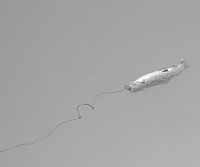| Fishing violations have become quite common in Utah. Violations including over limits and illegal transportation of fish are amongst the many occurances Division of Wildlife Resources officials have witnessed this year. Fish are also being disposed of improperly in Utah waters. Recently, this fish was found dead in the Gigliotti Pond in Helper with the line still attached. If anglers plan to catch and release fish, they must make sure that the fish are returned to the water in good condition. If a hook is too deep to remove, anglers should cut the line as short as possible and allow the hook to rust away. This is a much safer method of releasing fish than keeping the line attached. Anglers should consult the current fishing proclamation before heading out on any fishing adventure to ensure proper fishing habits are exercised. |
Increasing numbers of certain fishing violations have created concerns for the Utah Division of Wildlife Resources. Conservation officers for the DWR have noted that some violations are becoming more frequent.
“We are concerned that some fishing violations are becoming more prevalent,” said Dan Barnhurst, DWR conservation officer. “These violations include over limits and the illegal transportation of live fish and crayfish, also known as crawdads.”
Anglers need to check the regulations in the 2002 Utah fishing proclamation and information publication before going fishing.
“The statewide trout limit is now four,” Barnhurst stated. “Also there are many waters with special regulations and anglers should check the provisions for specific waters section for each new water they fish. We also encourage anglers that fish numerous waters to check more often as regulations may be different for those waters.”
“For example, one common mistake is violating size restrictions,” Barnhurst explained. One example is the new fishing limits at Gigliotti Pond in Helper. The limit is currently eight fish, however bass and bluegill are to be released. By taking these fish, anglers are violating fishing laws.
Transporting live fish and crayfish is also occuring more frequently.
“A common violation with the potential for some very serious consequences is the transportation of live fish or crayfish away from the water where they were caught,” Barnhurst explained. “With the increasing popularity of boats with aerated live-wells, we’ve seen an increase in the number of people transporting live fish. While most anglers are merely keeping their fish fresh until they get home, others transport fish to make illegal transplants to other waters.”
While it could cost the angler steep fines, loss of fishing privileges, and possible forfeiture of fishing equipment and boats, the total costs are much greater.
“This serious violation has cost Utahn’s millions of dollars,” Barnhurst explained. “DWR had to treat waters to remove the unwanted fish and restock with fish better suited for the management of each water.”
Besides the treatment costs, local businesses have lost millions when waters are no longer productive fisheries and anglers go elsewhere to fish.
Not all illegal transplants are intentional however. “Another serious violation occurs when small fish or crawdads are caught on one water and moved alive to another water to use as bait,” Barnhurst said.
Problems occur when the bait either gets loose or when anglers dump leftovers into the waters, thinking they are just providing more forage.
Sometimes these baitfish can escape predation and begin breeding, resulting in a new, unwanted fish population entering the system.
“Remember, the use of live fish for bait is illegal and transporting any live fish or crawdad is a violation the DWR will enforce strictly,” warned Barnhurst. “To avoid problems, all live-wells should be drained and the fish or crayfish killed and put on ice before leaving the water where the fish are caught. Draining these live-wells will also help prevent the spread of diseases and other unwanted critters such as whirling disease, New Zealand mud snails and zebra mussels.”
Barnhurst said the division has a reward program for citizens who report information that leads to a conviction and he encourages citizens to report violations.
“Conservation officers need all the help they can get,” Barnhurst stated. “We love to pay the rewards to those that provide the information that leads to a successful prosecution of poachers for any wildlife species.
Any information regarding animal poaching should be directed to the help stop poaching hotline at 800-662-3337.

